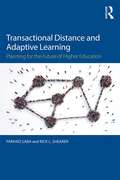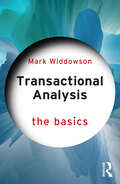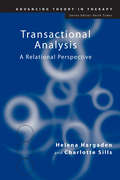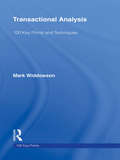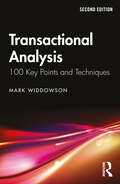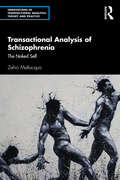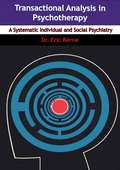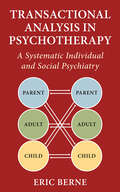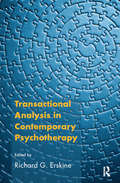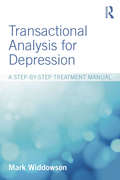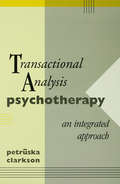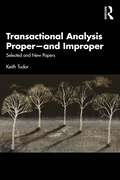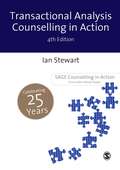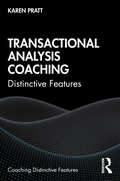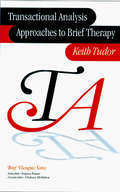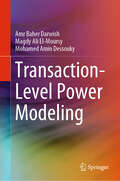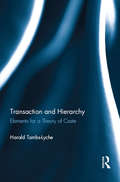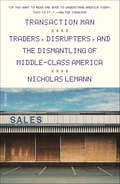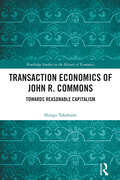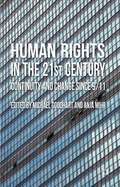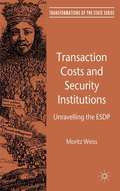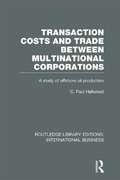- Table View
- List View
Transactional Distance and Adaptive Learning: Planning for the Future of Higher Education
by Farhad Saba Rick L. ShearerTransactional Distance and Adaptive Learning takes a fresh look at one of the pioneering educational theories that accommodates the impact of information and communications technologies in learning. The theory of transactional distance (TTD) provides a distinct analytical and planning foundation for educators to conduct an overarching inquiry into transitioning from mass instructional and management systems in higher education to dynamic and transformational futures that focus on each individual learner. Based on the TTD, this pragmatic approach offers instructors, administrators, students, and other stakeholders a comprehensive planning method to assess the current state of their instructional, learning, and management practices and to develop alternative models to prescribe future improvements in their institution. This complex, self-organized, and adaptive method includes current and emergent properties of: hardware, software, and telecommunications systems that allow faculty, students, and administrators to communicate; instructional and curriculum systems that provide teaching and learning environments for faculty and students; and management, societal, and global systems that influence how institutions are supported, funded, and managed.
Transactional Analysis: The Basics (The Basics)
by Mark WiddowsonThis accessible textbook on transactional analysis (TA) provides a comprehensive overview of TA theory, with a strong emphasis throughout on practical application.The core theory of TA is explained, as well as how concepts have developed over time. Each theoretical concept is presented with brief examples or vignettes from different fields of application of TA (such as psychotherapy, counselling, education and organisational) and – crucially – how TA can be used in everyday life. To facilitate the learning of concepts, the book includes personal development activities at the end of chapters together with suggestions for further reading.This is an essential text for complete beginners and first year students on TA training courses as well as students on counselling and psychotherapy training, and those undertaking training in organisational development and coaching.
Transactional Analysis: A Relational Perspective (Advancing Theory in Therapy)
by Charlotte Sills Helena HargadenTransactional analysis is growing in popularity as an approach to psychotherapy, and this book provides an in-depth, comprehensive model of theory and practice.Transactional Analysis: A Relational Perspective presents a relational model of psychotherapy which reflects the theoretical and methodological changes that have been evolving over recent years. In this book, Helena Hargaden and Charlotte Sills tell the story of their model through case history, theory and diagram illustrating how the unconscious process comes to life in the consulting room. Their relational theory and applied methodology of transactional analysis makes it possible to chart realms of uncertainty and the unknown, (deconfusion of the Child ego state), with theoretical assistance. Transactional Analysis: A Relational Perspective covers:* the approach* the dynamics of the relationship* therapeutic transactions* wider implications.It looks at the whole therapeutic relationship, from the establishment of the working alliance, to the terminating of therapy and beyond. It will be of great interest to postgraduates and professionals in the field of psychotherapy.
Transactional Analysis: 100 Key Points and Techniques (100 Key Points)
by Mark WiddowsonTransactional Analysis (TA) is a versatile and comprehensive system of psychotherapy. Transactional Analysis: 100 Key Points and Techniques synthesises developments in the field, making complex material accessible and offering practical guidance on how to apply the theory and refine TA psychotherapy skills in practice. Divided into seven manageable sections, the 100 key points cover: the philosophy, theory, methods and critique of the main approaches to TA TA perspectives on the therapeutic relationship diagnosis, contracting and treatment planning using TA a trouble shooting guide to avoiding common pitfalls refining therapeutic skills As such this book is essential reading for trainee TA therapists, those preparing for examinations as well as experienced practitioners who will find much practical guidance on the skilful and mindful application of this cohesive system of psychotherapy.
Transactional Analysis: 100 Key Points and Techniques (100 Key Points)
by Mark WiddowsonThe second edition of Transactional Analysis: 100 Key Points and Techniques synthesizes developments in Transactional Analysis (TA) and psychotherapy research, making complex ideas accessible and offering therapists practical guidance on refining TA psychotherapy skills. Divided into seven parts, the 100 key points cover: • The philosophy, theory, methods and critique of the main approaches to TA • New developments and approaches in TA • TA perspectives on the therapeutic relationship • Client assessment, diagnosis and case formulation • Contracting and treatment planning using TA • A troubleshooting guide to avoiding common pitfalls • Refining therapeutic skills Specific updates incorporate emergent approaches in TA, recent developments in the understanding of neurodiversity and current best practice thinking. This book is essential reading for trainee and beginner TA therapists, as well as experienced practitioners looking to update their field knowledge for a skilful and mindful application of this cohesive system of psychotherapy.
Transactional Analysis of Schizophrenia: The Naked Self (Innovations in Transactional Analysis: Theory and Practice)
by Zefiro MellacquaIn Transactional Analysis of Schizophrenia: The Naked Self, Zefiro Mellacqua presents a full assessment of the relevance and value of transactional analysis in understanding, conceptualizing and treating schizophrenia in contemporary clinical settings. Opening with a review of Eric Berne’s ideas, Mellacqua applies theory to the understanding and psychotherapeutic treatment of people suffering from first-episode schizophrenia and to those already living with more long-lasting psychotic levels of self-disturbance. The chapters address a series of crucial methodological themes, including the need for both intensive and extensive analytic sessions; the therapist’s tolerance of uncertainty and not knowing; the informative quality of both therapist’s and patient’s embodiment(s); the emergence of the transference-countertransference relationship; the link between silent transactions and unconscious communication; dream analysis; and the value of regular supervisions. Mellacqua’s approach incorporates meetings with family and caregivers, as well as emphasising multidisciplinary work with patients in a variety of settings, such as in hospitals, outpatient clinics, and psychiatric home treatment. The book is illustrated with engaging clinical case studies throughout, which illuminate the schizophrenic experience and provide examples of how these tools can be used to help patients. Transactional Analysis of Schizophrenia demonstrates how those who suffer from acute schizophrenia, especially those at their very first episode of psychosis, can make an effective recovery and live a satisfying life through the therapeutic application of transactional analysis. It will be essential reading for transactional analysts, psychodynamically oriented psychotherapists, psychologists, psychiatrists, nurses, social workers, academics and all mental health professionals working with people suffering from schizophrenic psychoses.
Transactional Analysis in Psychotherapy: A Systematic Individual and Social Psychiatry (Condor Bks.)
by Dr Eric BerneOriginally published in 1961, this book outlines a new, unified system of individual and social psychiatry that were introduced in the United States around that time with remarkable success in various hospitals and other psychiatric establishments. Essentially designed for group therapy, this approach is now used by institutions, group workers, and in private practice with neurotics, psychotics, sexual psychopaths, psychosomatic cases, and adolescents.Transactional analysis begins its program by initiating the individual patients into the theory upon which the treatment is based. First attaining a measure of self-knowledge through private sessions with the analyst, the patient then meets with other patients in group therapy, participating in a series of personally meaningful relation-ships in which he becomes increasingly aware of the cause and nature of his illness, preparing at the same time to overcome it."A comprehensive method of treatment that has no precedent in its concreteness of structure without at the same time diminishing the dynamic quality of the treatment....No one to my knowledge has presented such a new approach."--Dr. Milton Schwebel, Professor of Education, New York University
Transactional Analysis in Psychotherapy: A Systematic Individual and Social Psychiatry
by Eric BerneIn this groundbreaking work, psychiatrist Dr. Eric Berne introduces a new method for understanding and analyzing human behavior, known as transactional analysis or "TA", which examines the interactions, or "transactions," between individuals and the ways in which they change in response to each other. Core to TA is the thesis that humans, as social organisms, are capable of adapting and changing in response to others. Though developed more than a half century ago, TA continues to shape the field of psychiatry and remains required reading for anyone investing the subject.
Transactional Analysis in Contemporary Psychotherapy
by Richard G. ErskineAfter fifty years of development and refinement in Transactional Analysis (TA), the theory of methods and the actual methods have changed considerably from those originally published by Eric Berne. Many concepts and methods have emerged and been subject to clinical experimentation, some have been refined and expanded and some are no longer used. This book includes contributions from several authors, each of whom presents his or her unique focus on how TA is used in their psychotherapy practice. This book will address the therapeutic effectiveness of various methods in TA and will cover a variety of topics such as unconscious experience, transference-countertransference, the therapist's transparency, transgenerational scripts, trauma and regression, psychological games, the self-destructive client, an integrative approach to the psychotherapy of obsession, gender psychopolitics, and psychotherapy from a social-cognitive perspective. It is written for both psychotherapists and counsellors who want to learn and refine their knowledge of contemporary TA methods that are most effective with today's clients.
Transactional Analysis for Depression: A step-by-step treatment manual
by Mark WiddowsonTransactional Analysis for Depression is the first research-based, transactional analysis psychotherapy manual. Developed from the author’s research into TA therapy for depression, the book also draws upon a wide range of contemporary research findings relating to depression and its treatment. Mark Widdowson provides the reader with a solid understanding about the nature of depression and clear guidance about how to provide effective psychotherapy for depressed clients. The book is a step-by-step guide to therapy, from the point of first contact through to ending, and covers: The theory and practice of TA therapy Understanding factors which maintain depression Conceptualising depression using Transactional Analysis Original material on the mechanisms of therapeutic change Optimising the psychotherapy process Key therapeutic processes in the therapy of depression Tailoring the therapy to client needs An introduction to neuroscience and the medical treatment of depression Complete with an additional resources section, including downloadable material designed to be given to clients to enhance the therapeutic process and strengthen the working alliance, Transactional Analysis for Depression provides structured, practical guidance to TA theory for therapists in practice and training.
Transactional Analysis Psychotherapy: An Integrated Approach
by Petruska ClarksonTransactional Analysis Psychotherapy: An Integrated Approach is the first advanced clinical textbook for many years, written for psychotherapists and counsellors who use the theory and techniques of Transactional Analysis in their practice or who are interested in expanding their repertoire. Clarkson provides a comprehensive guide to goal-setting and clinical planning for every stage of treatment. Not only a practical textbook relevant to modern developments in supervision, but one which makes a new and original contribution to ways of thinking about transference and countertransference, the theory of self and the process of psychotherapeutic change.
Transactional Analysis Proper—and Improper: Selected and New Papers
by Keith TudorTransactional Analysis Proper—and Improper: Selected and New Papers offers a critical reading of transactional analysis (TA), which analyses, deconstructs, and reconstructs its foundational theory.Keith Tudor’s work is detailed, informative, and critical, and written with deep affection for TA and its founder, Eric Berne. Beginning with its philosophical foundations, Tudor considers TA’s ontological assumptions about the essence of human beings, its method and methodology, and its treatment philosophy. A series of chapters then review and advance TA’s theory of transactions, ego states, life scripts, and psychological games, and the book concludes with two chapters which both honor TA’s traditions and look forward to what TA might do differently.This book offers a unique ‘insider but independent’ perspective on transactional analysis. It will be essential reading for students and practitioners of transactional analysis and encourages free, independent, and critical thinking about TA and its place in the world.
Transactional Analysis Counselling in Action (Counselling in Action)
by Dr Ian StewartSAGE celebrated the 20th Anniversary of the Counselling in Action in November 2008. To view the video - click here ----------------------------------------------------- Praise for the First Edition: `Ian Stewart has made the difficult link between theory and practice clear without being patronizing. This is valuable for everyone interested in TA since many concepts can only be fully assimilated when linked to actual examples. Even if you are not in clinical practice, this book would be a useful addition to your library and, for anyone in training or beginning practice, this is required reading' - Group Relations Transactional Analysis Counselling in Action, Third Edition meets a demand for a clearly-written step-by-step account of the process and practice of using transactional analysis to promote personal change. --------------------------------------------------------- This book retains the successful overall structure and organisation of the popular earlier editions, but has been fully revised. Key features of this new edition include: " concise, "hands-on" descriptions of current techniques and concepts in transactional analysis, presented in an accessible style that is immediately useful to the practitioner " the sequence of chapters ordered to reflect successive stages in the typical process of therapeutic change using transactional analysis. This assists in building understanding and application of transactional analysis step by step, in the order that is likely to arise during actual psychotherapy or counselling " expanded discussion of the protective procedure known as "closing the escape hatches" (no-suicide, no-homicide, no-go-crazy decision), including possible contra-indications " a single extended case history that runs through the book to illustrate practice and theory " "Key Ideas" panels which provide summaries of the main ideas that are described in each section or chapter " "Self-supervision sequences" offering suggested checklists of questions that readers can use in appraising their own work with clients. In this revised Third Edition of his bestselling guide, Ian Stewart offers trainee and practising psychotherapists and counsellors an introduction to the core concepts and basic techniques of transactional analysis. Ian Stewart is Co-Director of The Berne Institute, Nottingham. He is accredited by the ITAA and the EATA as a Teaching and Supervising Transactional Analyst.
Transactional Analysis Coaching: Distinctive Features (Coaching Distinctive Features)
by Karen PrattThis important book distils the essence of developmental Transactional Analysis (TA) frameworks that are most useful to bring alive professional coaching competencies. Karen Pratt offers clear outlines of TA frameworks as well as describing how they are applied in coaching, with snippets of coaching conversations as illustrations of the theory in practice. Pratt highlights key TA frameworks in enough detail to be easily grasped but with a focus on application in coaching and other developmental conversations. A TA approach powerfully guides coaches in their listening and questioning. TA is not used as a coaching ‘technique’ – it offers psychological understanding of human beings and the meaning they make of who they are in the world. Such awareness is key for both professionals and clients in meaningful partnerships for development. Transactional Analysis Coaching will be key reading for professionals working within present-centered contracts for change – coaches, trainers, facilitators, supervisors, teachers, mentors and managers – seeking to understand how TA can impact their development. It will be of great interest to coaches in training and will provide a useful resource for clients in their ongoing development.
Transactional Analysis Approaches to Brief Therapy: What do you say between saying hello and goodbye? (Brief Therapies series)
by Mr Keith Tudor`This book, edited by Keith Tudor (who is also one of the ten contributors) is excellent reading for a number of reasons: for those who know nothing about TA, it is a highly informative and readily accessible introduction. For those who read or studied it some time ago, it is an excellent refresher. I am impressed by the diversity of people and applications of TA, and the developments outlined in this book are, certainly for me, cause for hope because, as well as offering frameworks for making 'simple' sense of humans in action - and human inaction - TA is a complex and profound system that offers people a way of solving the problems of the present, re-evaluating the struggles of the past, and reshaping the future with permission and power based on a greater sense of self' - Nurturing Potential `I wholeheartedly recommend this book to all therapists as enriching and interesting reading' - European Association for Transactional Analysis Newsletter `It is a book which would offer helpful introductions to both the practice of transactional analysis, and the attitude needed when planning brief therapy of any kind' - The Jounal of Analytical Psychology Of all the approaches to therapy, transactional analysis is arguably one of those most suited to time-limited work. At a time when short-term therapy is increasingly dominant as a form of practice, Transactional Analysis Approaches to Brief Therapy provides an insightful guide which both informs and challenges. Rather than a single theory, TA has developed as a group of four schools which share a common philosophy, but place different emphasis on what occurs during the therapeutic process. Written by therapists at the leading edge of developments in TA, the book presents and differentiates each of these four approaches. Through transcripts and commentaries, it shows how theory applies to practice, for example in treating post-traumatic stress or in achieving a one-session cure. The book also includes a useful glossary of TA terms, as well as an appendix of Eric Berne's short script-questionnaire. In some ways critical of the zeitgeist of short-termism and the commercial pressures for therapy to be brief, the book seeks a balance between the challenge TA offers as an actionistic approach to quick and efficient therapy and the importance of relationship in therapy which is time-conscious. It will be enlightening reading for all those training and those already trained as therapists and counsellors in TA.
Transaction-Level Power Modeling
by Amr Baher Darwish Magdy Ali El-Moursy Mohamed Amin DessoukyThis book describes for readers a methodology for dynamic power estimation, using Transaction Level Modeling (TLM). The methodology exploits the existing tools for RTL simulation, design synthesis and SystemC prototyping to provide fast and accurate power estimation using Transaction Level Power Modeling (TLPM). Readers will benefit from this innovative way of evaluating power on a high level of abstraction, at an early stage of the product life cycle, decreasing the number of the expensive design iterations.
Transaction and Hierarchy: Elements for a Theory of Caste
by Harald Tambs-LycheIn this volume, the author challenges a number of widely held cultural stereotypes about India. Caste is not as old as Indian civilization itself, and current changes are no more radical than in the past, for caste has evolved throughout its history. It is not a colonial invention, nor does it result from weak state control. There is no single form of Indian kingship, and power relations, fundamental as they are for understanding Indian society. Nor do Indian villages conform to a single type, and caste is as much urban as rural. Only in a regional ‘local’ perspective can we view it as a ‘system’. Caste does offer space for the individual, though in a particular Indian mould, and Hinduism does not provide for an integration of castes through ritual. In short, social organization varies widely in India, and cannot provide the key to the specificity of caste. This must be sought in the way society is imagined, the models of society current in Indian thought. Of course as mentioned above, there is no single model: Brahmins, kings, and merchants among others have all produced alternative models with themselves at the centre, vying for hegemony, while facing contesting models held by subalterns. Still, a hierarchical mode of thought is hegemonic and largely explains why Indians see their social stratification differently from people in the West. The volume will be indispensable for scholars of South Asian Sociology and Culture.
Transaction Man: Traders, Disrupters, and the Dismantling of Middle-Class America
by Nicholas LemannAn Amazon Best History Book of 2019"A splendid and beautifully written illustration of the tremendous importance public policy has for the daily lives of ordinary people." —Ryan Cooper, Washington MonthlyOver the last generation, the United States has undergone seismic changes. Stable institutions have given way to frictionless transactions, which are celebrated no matter what collateral damage they generate. The concentration of great wealth has coincided with the fraying of social ties and the rise of inequality. How did all this come about?In Transaction Man, Nicholas Lemann explains the United States’—and the world’s—great transformation by examining three remarkable individuals who epitomized and helped create their eras. Adolf Berle, Franklin Delano Roosevelt’s chief theorist of the economy, imagined a society dominated by large corporations, which a newly powerful federal government had forced to become benign and stable institutions, contributing to the public good by offering stable employment and generous pensions. By the 1970s, the corporations’ large stockholders grew restive under this regime, and their chief theoretician, Harvard Business School’s Michael Jensen, insisted that firms should maximize shareholder value, whatever the consequences. Today, Silicon Valley titans such as the LinkedIn cofounder and venture capitalist Reid Hoffman hope “networks” can reknit our social fabric.Lemann interweaves these fresh and vivid profiles with a history of the Morgan Stanley investment bank from the 1930s through the financial crisis of 2008, while also tracking the rise and fall of a working-class Chicago neighborhood and the family-run car dealerships at its heart. Incisive and sweeping, Transaction Man is the definitive account of the reengineering of America and the enormous impact it has had on us all.
Transaction Economics of John R. Commons: Towards Reasonable Capitalism (Routledge Studies in the History of Economics)
by Shingo TakahashiTakahashi reconstructs the key blocks of one of the founders of the institutional school, John R. Commons’ theories of the evolution of capitalism and of institutional change by taking the concept of transaction as a central point of departure.Commons’ theories continue to influence modern economics, and in this book, Takahashi scrutinizes his construction of transaction and its features and offers a reinterpretation of Commons’ institutional economics and transaction economics. He then explores how Commons’ analysis of going concerns (e.g., firms) has broader and deeper applications that extend to monetary policy, labor policy, and the business cycle. Takahashi examines how Commons’ and Veblen’s dynamic theories share cumulative causation. He closes by positing that Commons’ transaction economics seeks “reasonable capitalism” through a virtuous cycle of reasonable value and generation of good business ethics.This book will be attractive to researchers of institutional economics, political economy, heterodox economics, as well as the history of economic thought, law, and ethics.
Transaction Costs and Security Institutions
by Anja Mihr Michael GoodhartThis is the first book to offer a systematic analysis of human rights in the 21st century. The chapters, written from diverse methodological perspectives, provide rich and varied insights on vital questions concerning the resiliency, weaknesses, and prospects of human rights today.
Transaction Costs and Security Institutions
by Moritz WeissExamines international cooperation in European security from a transaction cost economics perspective. This book addresses the puzzle of how to approach differing institutional preferences. It argues that the reduction and limitation of transaction costs was the primary determinant of security preferences.
Transaction Costs & Trade Between Multinational Corporations: A Study Of Offshore Oil Production (Routledge Library Editions: International Business)
by C Paul HallwoodUntil this book was published little had appeared on the matter of the organization of production in oil gathering. This book: Describes the global offshore oil supply industry and its features on one of the world’s major offshore oil services bases Draws on the theory of the multinational corporation to explain why buyers and sellers should have internationalized themselves into a symbiotic relationship Discusses the preference of the oil companies for vertical disintegration Explains the transaction cost paradigm Integrates the largely American literature on the transaction cost paradigm with the literature on the multinational corporation (which is largely British).
Transaction Cost Management: Strategies and Practices for a Global Open Economy (Management for Professionals)
by Chihiro SuematsuAll organizations, institutions, business processes, markets and strategies have one aim in common: the reduction of transaction costs. This aim is pursued relentlessly in practice, and has been perceived to bring about drastic changes, especially in the recent global market and the cyber economy. This book analyzes and describes “transactions” as a model, on the basis of which organizations, institutions and business processes can be appropriately shaped. It tracks transaction costs to enable a scientific approach instead of a widely used “state-of-the-art” approach, working to bridge the gap between theory and practice.This open access book analyzes and describes “transactions” as a model...
Transaction Cost Management
by Chihiro SuematsuAll organizations, institutions, business processes, markets and strategies have one aim in common: the reduction of transaction costs. This aim is pursued relentlessly in practice, and has been perceived to bring about drastic changes, especially in the recent global market and the cyber economy. This book analyzes and describes "transactions" as a model, on the basis of which organizations, institutions and business processes can be appropriately shaped. It tracks transaction costs to enable a scientific approach instead of a widely used "state-of-the-art" approach, working to bridge the gap between theory and practice.
Transaction Cost Economics and Beyond: Toward a New Economics of the Firm
by Michael DietrichIn recent years transaction costs economics have come to dominate the discussion of the nature and organization of firms. In Transaction Costs Economics and Beyond Michael Driscoll offers a critical exploration of transaction costs. He argues that whilst they have much to offer they are still an inadequate basis for a general theory of the firm. Drawing on theories of organizational behaviour as well as economics, he concludes by offering a theory of the firm that allows for both hierarchical and creative decision making.
